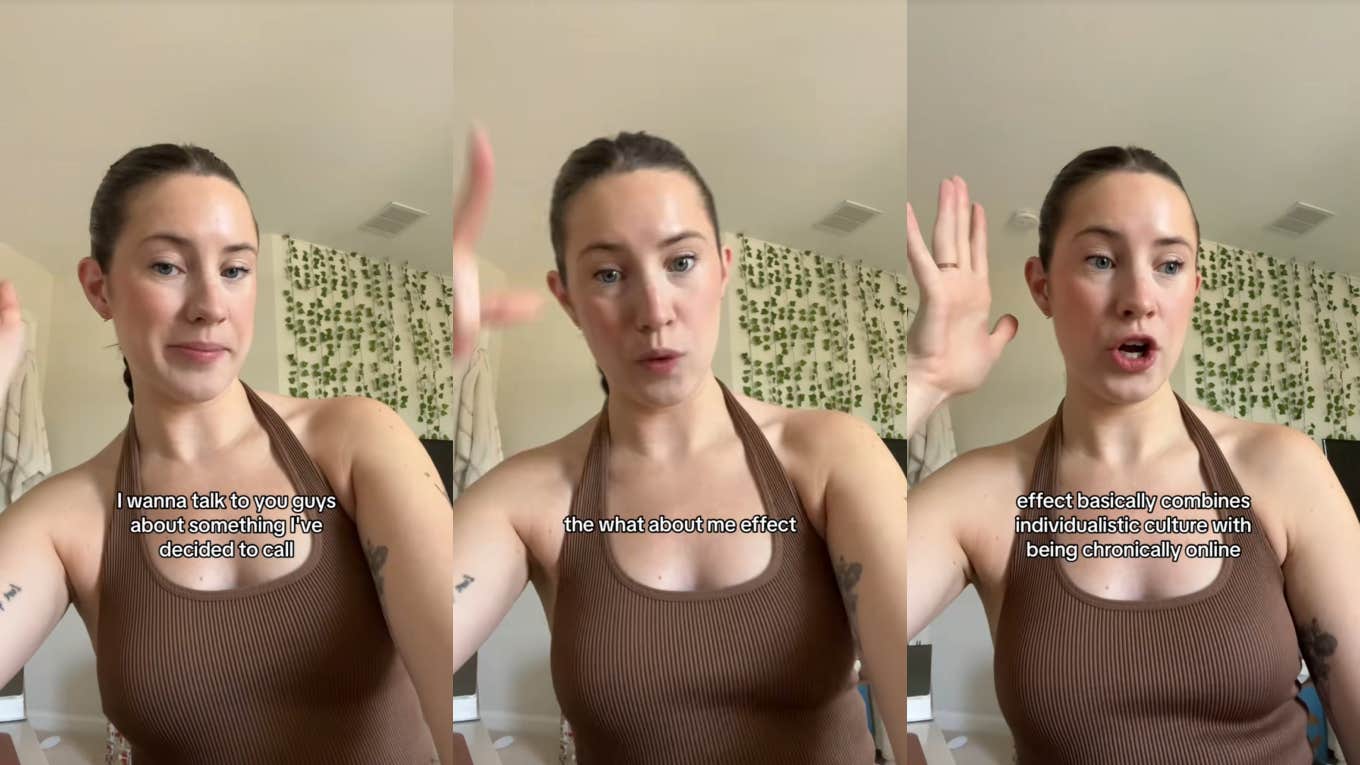Woman Coins 'What About Me Effect' As The Reason Why Everyone Takes Everything So Personally Online
The term highlights the need for media literacy and a different perspective on social media engagement.
 @sarahthebookfairy
@sarahthebookfairy Sarah, who describes herself as “a girls girl who likes deep talks, T Swift, and books about fairies,” recently uploaded a video on TikTok in which she coins the phrase the “What About Me Effect,” a mindset that occurs when you mix a chronically online point of view with the hyper-individualistic society we’ve come to know in the US today.
She believes the ‘What About Me Effect’ is why everyone takes everything so personally online.
The “What About Me Effect” is rampant on TikTok, according to Sarah, and although she says it’s “easy to write it off as a lack of common sense or critical thinking,” she believes the issue goes much deeper than that.
First and foremost, the “What About Me Effect” is when someone sees something online that doesn’t necessarily pertain to them — they weren’t the target audience or it just isn’t something they relate to — and tries to make it about them anyway.
As an example, Sarah refers to a recently viral video about a “bean soup” that someone created. The bean soup is supposed to be high in Iron, which should, allegedly, help people with their periods. The “What About Me Effect” is illustrated by all of the people who commented “What should I do if I don’t like beans?” or “How do I make this without the beans?”
These people are trying to seek out accommodations or validation for their very nuanced personal situation.
The problem with this mentality is that people will then try to flex their moral superiority over others for not applying the subject to everybody, asking things like why didn’t that person make a bean soup without beans? The answer should simply be that the video wasn’t for people who don’t like beans.
Before allowing the right to co-opt Sarah’s discussion points (as it does sound similar to the “snowflake” argument), she clarifies that she’s very much a leftist who believes in equality and inclusion for everyone, she just believes that the “What About Me Effect” could cause unnecessary problems.
She encourages people to stop themselves from making other people's posts about them.
“So when you come onto this app and you see a video and you have the urge to comment something like, ‘well, what about my very specific scenario’ or ‘well, not everyone can blah blah,’ I’m going to encourage you to stop,” she explains. “Use your noggin, and remember that things are nuanced not everything can apply to every single person and there doesn’t always need to be a specific accommodation for you.”
For example, there’s no reason Sarah should come home from a long day, scroll through TikTok, see a video about how to put her hair up in a really cute way, and then read a comment asking “What if I’m bald?” — which she claims has actually happened. She equates it to her having a gluten intolerance and commenting on baking posts all over the site that she can’t have gluten.
“That would be ridiculous,” she exclaims. “I can just go watch videos of people making gluten-free bread.”
There’s a level of media literacy that is required in order for people to engage with social media in an acceptable way.
When you’re chronically online, it’s hard to remove yourself from the boundaries set in place by your phone screen and recognize that there are perspectives that exist outside of your own.
Some people use social media to interact with the world, and when they start to feel left out or excluded, they try to insert themselves into the situation in the only way they know how — making it about them or their opinion. This results in the “What About Me Effect.”
Differences in perspectives (so long as they do not harm others) should be celebrated instead of twisted into things that they aren't. If the bean soup video didn't help you out, then it wasn't made for you.
Isaac Serna-Diez is an Assistant Editor for YourTango who focuses on entertainment and news, social justice, and politics.

